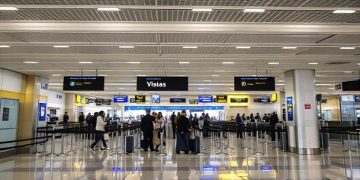LONDON – The United Kingdom and India are nearing the final stages of negotiations for a bilateral free trade agreement, with recent developments suggesting compromises on key issues including visas and carbon-related import taxes.
According to a U.K. government official, the latest proposals would allow around 100 additional visas annually for Indian professionals. While modest compared to India’s initial request for broader visa access—particularly for workers in IT and healthcare—the new provisions mark progress in resolving the “mobility” chapter of the trade agreement.
The changes, expected to be administered by the U.K. Home Office, aim to provide more certainty around inter-company transfers. A source close to the talks emphasized that no definitive figure is being assigned to potential inflows of Indian workers, noting the issue remains politically sensitive due to ongoing debates about migration levels.
Indian Commerce Minister Piyush Goyal is scheduled to visit London this week for further discussions. He is expected to advocate for additional concessions, including exemptions from the U.K.’s developing carbon border tax and the establishment of a system for refunding pension contributions made by Indian professionals on temporary work assignments in the U.K.
The U.K. Department for Business and Trade reiterated its commitment to securing a deal that benefits both countries. “We will only sign a deal that is in the best interests of the British people and drives growth across the U.K.,” a department spokesperson said.
Negotiations were relaunched earlier this year following a meeting between Goyal and U.K. Trade Secretary Jonathan Reynolds. Since then, U.K. officials have noted a “step change” in India’s approach, with Indian representatives reportedly showing increased willingness to reach a final agreement.
Indian officials, however, have cautioned against interpreting the urgency as a reaction to international trade tensions, such as those stemming from U.S. policy changes. Finance Minister Nirmala Sitharaman, speaking earlier this month, emphasized that India’s focus remains on securing mutually beneficial terms.
One area of concern for Indian negotiators is the U.K.’s proposed carbon border tax, part of efforts to align with the European Union’s Carbon Border Adjustment Mechanism (CBAM), which could affect imports of steel, cement, and other high-emission goods. Indian officials have voiced concern over how such measures might impact trade post-agreement.
Progress in aligning the U.K. and EU carbon tax systems is expected to be discussed further during a U.K.–EU summit scheduled for May 19. Meanwhile, Minister Goyal is also expected to engage with EU officials in Brussels following his U.K. visit.
Negotiators on both sides have expressed cautious optimism that the agreement is nearing completion, though some issues remain unresolved. Indian officials have underlined the need for continued flexibility to ensure a balanced outcome.
Catch the latest in supply chain news on The Supply Chain Report. Visit ADAMftd.com for free international trade tools.
#IndiaUKTrade #TradeDealNegotiations #GlobalTrade #VisaPolicy #CarbonTax #InternationalRelations #BilateralTrade















